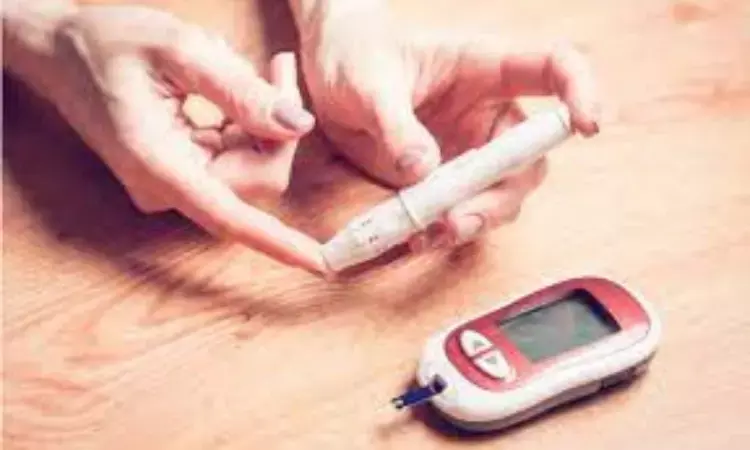- Home
- Medical news & Guidelines
- Anesthesiology
- Cardiology and CTVS
- Critical Care
- Dentistry
- Dermatology
- Diabetes and Endocrinology
- ENT
- Gastroenterology
- Medicine
- Nephrology
- Neurology
- Obstretics-Gynaecology
- Oncology
- Ophthalmology
- Orthopaedics
- Pediatrics-Neonatology
- Psychiatry
- Pulmonology
- Radiology
- Surgery
- Urology
- Laboratory Medicine
- Diet
- Nursing
- Paramedical
- Physiotherapy
- Health news
- Fact Check
- Bone Health Fact Check
- Brain Health Fact Check
- Cancer Related Fact Check
- Child Care Fact Check
- Dental and oral health fact check
- Diabetes and metabolic health fact check
- Diet and Nutrition Fact Check
- Eye and ENT Care Fact Check
- Fitness fact check
- Gut health fact check
- Heart health fact check
- Kidney health fact check
- Medical education fact check
- Men's health fact check
- Respiratory fact check
- Skin and hair care fact check
- Vaccine and Immunization fact check
- Women's health fact check
- AYUSH
- State News
- Andaman and Nicobar Islands
- Andhra Pradesh
- Arunachal Pradesh
- Assam
- Bihar
- Chandigarh
- Chattisgarh
- Dadra and Nagar Haveli
- Daman and Diu
- Delhi
- Goa
- Gujarat
- Haryana
- Himachal Pradesh
- Jammu & Kashmir
- Jharkhand
- Karnataka
- Kerala
- Ladakh
- Lakshadweep
- Madhya Pradesh
- Maharashtra
- Manipur
- Meghalaya
- Mizoram
- Nagaland
- Odisha
- Puducherry
- Punjab
- Rajasthan
- Sikkim
- Tamil Nadu
- Telangana
- Tripura
- Uttar Pradesh
- Uttrakhand
- West Bengal
- Medical Education
- Industry
Patients with diabetes and ESKD on dialysis more prone to blood sugar swings: Study

USA: Hypoglycemic crises were found to be three times more common than hyperglycemic crises in a nationwide study of patients with diabetes/end-stage kidney disease (ESKD). This was far more than the national reports in nondialysis patients with chronic kidney disease (CKD).
In simpler words, patients with diabetes and ESKD who are on dialysis may be more likely to have severe hypoglycemic and hyperglycemic crises than those who have CKD and are not on dialysis. "So, these data represent a call for action for innovative and personalized strategies that can decrease these preventable -- and in many cases iatrogenic -- acute diabetes complications in this population," researchers said.
Rodolfo J. Galindo, and the team in their study published in the journal Diabetes Care, characterized annual trends of severe hypoglycemic and hyperglycemic crises (diabetic ketoacidosis/hyperglycemic hyperosmolar state) in patients with diabetes and ESKD.
The researchers conducted a nationwide, retrospective study of adults (≥18 years old) with diabetes/ESKD, from the United States Renal Data System registry, between 2013 and 2017.
The primary outcome was annual rates of emergency department visits or hospitalizations for hypoglycemic and hyperglycemic crises, reported as number of events/1,000 person-years.
The study revealed the following findings:
- Among 521,789 adults with diabetes/ESKD (median age 65 years), overall adjusted rates of hypoglycemic and hyperglycemic crises were 53.64 and 18.24 per 1,000 person-years, respectively.
- For both hypoglycemia and hyperglycemia crises, respectively, the risks decreased with age and were lowest in older patients (≥75 vs. 18–44 years old: incidence rate ratio 0.35 and 0.03), women (1.09, and 1.44), and those with smoking (1.36, and 1.71), substance abuse (1.27, and 1.53), retinopathy (1.10 and 1.36), and insulin therapy (vs. no therapy; 0.60 and 0.44).
- For hypoglycemia, specifically, additional risk was conferred by Black race (1.11) and amputation history (1.20).
"In this nationwide study of patients with diabetes/ESKD, hypoglycemic crises were threefold more common than hyperglycemic crises, greatly exceeding national reports in nondialysis patients with chronic kidney disease," wrote the authors. "Young, Black, and female patients were disproportionately affected."
Reference:
Hypoglycemic and Hyperglycemic Crises Among U.S. Adults With Diabetes and End-stage Kidney Disease: Population-Based Study, 2013–2017. Rodolfo J. Galindo, Mohammed K. Ali, Shealeigh A. Funni, Andrew B. Dodge, Shaheen S. Kurani, Nilay D. Shah, Guillermo E. Umpierrez, Rozalina G. McCoy. Diabetes Care Nov 2021, dc211579; DOI: 10.2337/dc21-1579
Dr Kamal Kant Kohli-MBBS, DTCD- a chest specialist with more than 30 years of practice and a flair for writing clinical articles, Dr Kamal Kant Kohli joined Medical Dialogues as a Chief Editor of Medical News. Besides writing articles, as an editor, he proofreads and verifies all the medical content published on Medical Dialogues including those coming from journals, studies,medical conferences,guidelines etc. Email: drkohli@medicaldialogues.in. Contact no. 011-43720751


